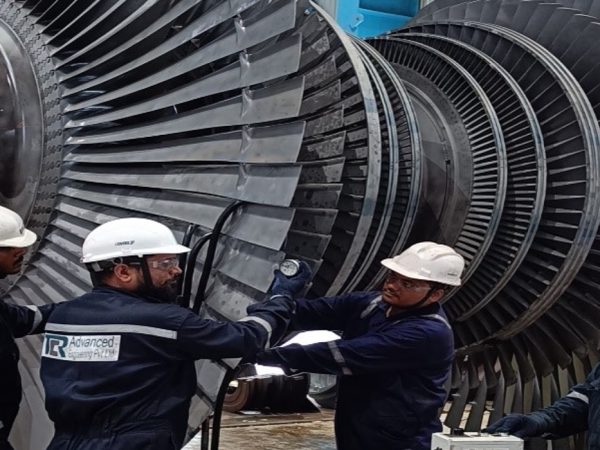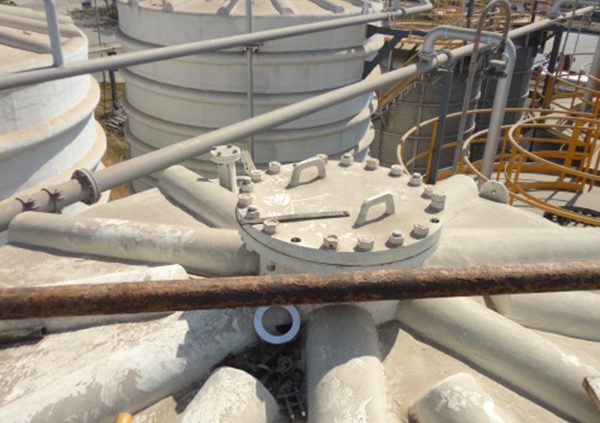In industries where safety, reliability, and performance matter the most, Material Testing plays a vital role in ensuring that components and structures meet required standards. From oil and gas pipelines to automobile parts, power generation equipment, aerospace, manufacturing to pharmaceutical machinery, every sector relies on material testing to verify the quality, durability, and safety of materials before they are put into use.
At TCR Advanced Engineering, we bring decades of expertise in testing, inspection, and certification, backed by our NABL(ISO/IEC- 17025) -accredited material testing lab. Our services help industries not only meet compliance requirements but also gain confidence in the long-term performance of their assets.
This blog explores the importance of material testing, the various methods used, the industries we serve, and how TCR Advanced continues to set benchmarks in quality assurance.
What is Material Testing?
Material testing refers to the process of examining, evaluating and certifying the mechanical, metallurgical, corrosion and chemical properties of materials to determine their suitability for intended applications. The process involves assessing characteristics such as strength, durability, hardness, ductility, toughness and resistance to wear, corrosion, or heat.
Testing ensures that materials are safe, reliable, and compliant with national and international standards such as ASTM, IS, DIN, EN, API, JIS and ASME. By conducting tests at different stages of development and production, industries can minimize failures, reduce risks, improve reliability and extend the lifecycle of their products.
Why is Material Testing Important in Industries?
Material testing is not just a compliance requirement but also a business necessity. Here’s why:
1. Safety & Reliability – Failures in critical components can lead to accidents, financial losses, or environmental hazards. Material testing ensures safe operations.
2. Quality Assurance – With Mechanical Testing, Tensile Testing, Hardness Testing, Impact testing, Bend Testing manufacturers can maintain consistent quality across products.
3. Regulatory Compliance – Industries must adhere to codes like ASTM, IS, API, and EN. NABL-accredited material testing lab ensure globally accepted certifications.
4. Cost Efficiency – Identifying defects early saves time, resources, and prevents large-scale failures.
5. Innovation & Development – Testing helps R&D teams experiment with new alloys, composites, and treatments to create stronger and more efficient products.

Types of Material Testing
At TCR Advanced, we specialize in comprehensive testing services designed to cover every industrial requirement.
1. Mechanical Testing
Mechanical testing determines how materials behave under different physical forces. Services include:
– Tensile Testing: Measures material strength, ductility, and elongation.
– Compression Testing: Evaluates how a material withstands crushing loads.
– Bend Tests & Flaring/ Flattening Tests: Used to assess weld and fabrication quality.
– Hardness Testing: Conducted using Rockwell, Brinell, and Vickers methods to measure resistance to deformation.
– Impact test–An Impact Test is a test used to measure a material’s ability to absorb energy and resist fracture under sudden impact or high strain rate loading. It helps to evaluate the toughness of a material, especially under dynamic or shock loading conditions.
Our expert teams are equipped with universal testing machines and advanced extensometers, ensuring precision in every result.
2. Chemical Testing
Accurate material composition is vital for performance. With spectro analysis, wet chemical analysis, and advanced spectrometer technology, TCR identifies and verifies the chemical makeup of metals and alloys, including iron, copper, nickel, titanium, and aluminum base alloys.
Chemical testing ensures that industries maintain material integrity and comply with specifications.
3. Metallurgical Testing & Metallography Services
Our Metallurgical Testing and Metallography Services involve microstructure examination to evaluate grain size, phases, and inclusions in metals. This is critical for validating heat treatment processes. Unlike traditional Hardness Testing alone, metallography identifies hidden defects and unwanted phases that can reduce component life.
4. Corrosion Testing
Industries like oil & gas, chemical, and power rely heavily on Corrosion Testing to prevent degradation of materials exposed to harsh environments. At TCR, we use methods like ASTM A 262, ASTM G 48, and ASTM B117 to determine corrosion resistance. This ensures safety and extended durability.
5. Nondestructive Testing (NDT)
Our Nondestructive Testing (NDT) services allow examination of materials without causing damage. Techniques such as ultrasonic testing, radiographic testing, magnetic particle inspection, and dye penetrant testing are crucial for detecting hidden defects in welds, castings, and forgings.
Standard Methods for Material Testing
Material testing must be consistent and credible. TCR Advanced adheres to international standards including:
– Mechanical: ASTM A370, IS 1608, EN 10002 , ASTM E10, E18, E92,E384
– Metallurgical: ASTM E112, ASTM E407, IS 6416
– Chemical: ASTM E1251, ASTM E1086
– Corrosion: ASTM G48, ASTM B117
– NDT: ASME Sec V, ASTM A388
Our NABL-accredited material testing labs ensure that results are globally recognized and trusted.
Challenges in Material Testing
Even with cutting-edge technology and sophisticated methods, industries often encounter several challenges when it comes to material testing. Ensuring accuracy, reliability, and compliance across diverse industries requires constant innovation and expertise. Below are the key challenges:
1. Hidden Defects Undetectable by Hardness Alone
Hardness testing has traditionally been a common acceptance criterion for evaluating the quality of materials. However, hardness readings alone can sometimes be misleading. Certain unwanted phases, inclusions, or internal defects may not be reflected in the hardness value, leading to an incomplete understanding of the material’s properties. Advanced metallurgical testing and microstructural analysis are crucial, as they provide a more comprehensive view of the material’s integrity.
2. Complex Material Structures Requiring Microstructural Analysis
Modern materials, particularly those used in industries such as aerospace, oil & gas, and power generation, often have complex alloy compositions and multi-phase microstructures. Evaluating such materials goes beyond simple mechanical tests. Detailed metallography services are required to study grain size, phase distribution, and microstructural features that directly influence performance under stress, temperature, or corrosive environments. Without microstructural insights, there is a risk of overlooking critical weaknesses that could lead to premature failure.
3. Time Sensitivity in Large-Scale Industrial Projects
In industries like oil and gas, petrochemicals, and construction, project timelines are extremely tight. Delays in material testing can cause project slowdowns, equipment downtime, or even financial losses. Clients often require fast turnaround without compromising accuracy. Advanced facilities like NABL-accredited material testing labs are equipped with modern technology and expert teams to ensure quick, precise, and reliable results.
4. Adherence to Evolving Standards Across Countries
Material testing is highly regulated, with different countries and industries following specific codes and standards like ASTM, IS, EN, API, ASME, and AWS. Keeping up with these constantly evolving international standards is a challenge for many organizations. This complexity demands skilled professionals who are well-versed in both national and global testing codes. Accredited laboratories, such as TCR Advanced, ensure compliance with these diverse standards, providing results that are universally accepted across industries.
By addressing these challenges with state-of-the-art equipment, certified experts, and NABL accreditation, TCR Advanced ensures reliable, accurate, and timely testing solutions tailored to industry needs.
Industries We Serve
Power Generation Industry
Material Testing plays a vital role in ensuring the reliability of turbines, boilers, and heat exchangers. TCR Advanced helps power plants enhance efficiency and safety through Mechanical Testing and Hardness Testing of critical components.
Fertilizer Industry
The fertilizer sector relies on pressure vessels and chemical-resistant materials. With Chemical Testing and Corrosion Testing, TCR Advanced ensures long-term durability and compliance with global standards.
Chemical & Petrochemical Industry
From reactors to pipelines, this industry demands high resistance against harsh environments. Our Nondestructive Testing (NDT) and Corrosion Testing services safeguard infrastructure against failures and downtime.
Oil & Gas
Reliability and safety are critical in drilling rigs, pipelines, and offshore structures. TCR Advanced delivers advanced Metallurgical Testing and Material Testing to prevent catastrophic breakdowns and maintain operational efficiency.
Insurance Sector
In insurance, accurate failure analysis is crucial for claims and risk management. TCR Advanced provides root cause investigations through Material Testing to support decision-making and liability assessments.
Pharmaceutical Industry
Machinery in pharma must meet strict compliance and safety standards. Our Surface Analysis and Mechanical Testing services ensure that production equipment is safe, reliable, and contamination-free.
Fabrication & Manufacturing
Structural reliability begins with strong materials. TCR Advanced performs Tensile Testing, Hardness Testing, and Mechanical Testing to validate welds, joints, and fabricated components.
Automobile Industry
The auto sector demands high-performance parts that withstand stress and fatigue. Our Metallurgical Testing and fatigue analysis services help manufacturers ensure the quality, performance, and safety of vehicles.
TCR Advanced: One-Stop Inspection for Your Machining Projects
With more than four decades of expertise, TCR Advanced has established itself as a leader in Material Testing. From Tensile Testing to Metallography Services, from Hardness Testing to Corrosion Testing, our end-to-end solutions are trusted by some of the world’s leading brands.
Our NABL accredited material testing labs are staffed with subject matter experts, industry veterans, and highly trained technicians who ensure that every test delivers accuracy, reliability, and actionable insights.
When safety, performance, and compliance are non-negotiable, TCR Advanced is your trusted partner.
FAQs
Q1: What is the purpose of Material Testing?
Material testing ensures that materials meet safety, durability, and performance standards, reducing risks of failure in critical applications.
Q2: How is Tensile Testing conducted?
Tensile Testing involves pulling a material sample until it breaks to measure its strength, ductility, and elongation properties.
Q3: What is the difference between Hardness Testing and Metallurgical Testing?
Hardness Testing measures resistance to deformation, while Metallurgical Testing examines the internal microstructure to detect hidden flaws and verify heat treatment.
Q4: Why is NABL accreditation important?
NABL accredited material testing labs follow ISO/IEC 17025:2017 standards, ensuring globally accepted, reliable, and traceable test results.
Q5: Which industries benefit the most from Material Testing?
Power, oil & gas, petrochemicals, manufacturing, automotive, and pharmaceuticals are among the key sectors relying on material testing.
Conclusion
The importance of Material Testing in modern industries cannot be overstated. Whether it’s ensuring the durability of an automobile component, the reliability of an oil pipeline, or the safety of power generation equipment, testing provides the confidence industries need to operate safely and efficiently.
TCR Advanced, with its NABL accredited material testing labs, advanced facilities, and expert teams, delivers unmatched solutions across Tensile Testing, Metallurgical Testing, Chemical Testing, Hardness Testing, Corrosion Testing, and Nondestructive Testing (NDT).
When industries seek precision, reliability, and compliance, TCR Advanced stands as the trusted partner for quality assurance.







